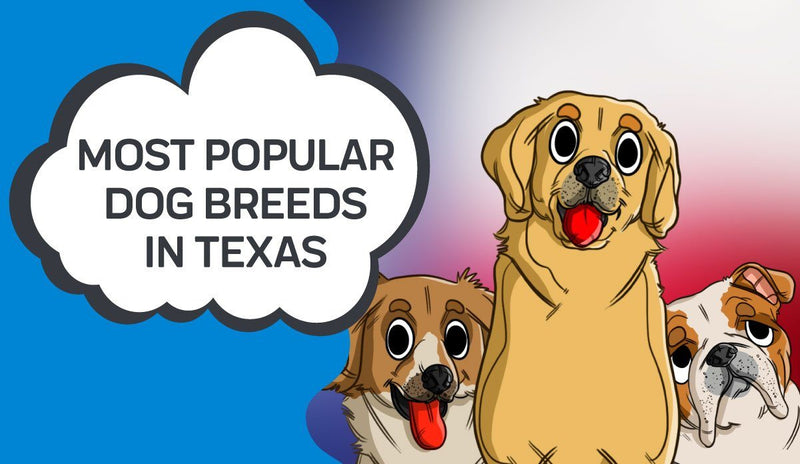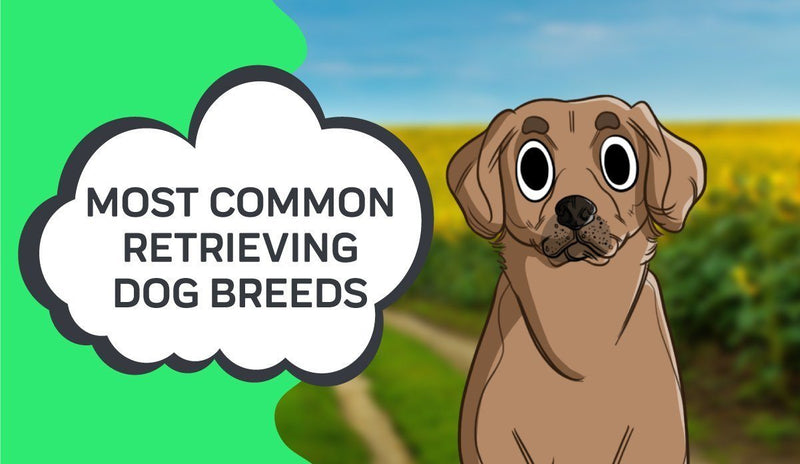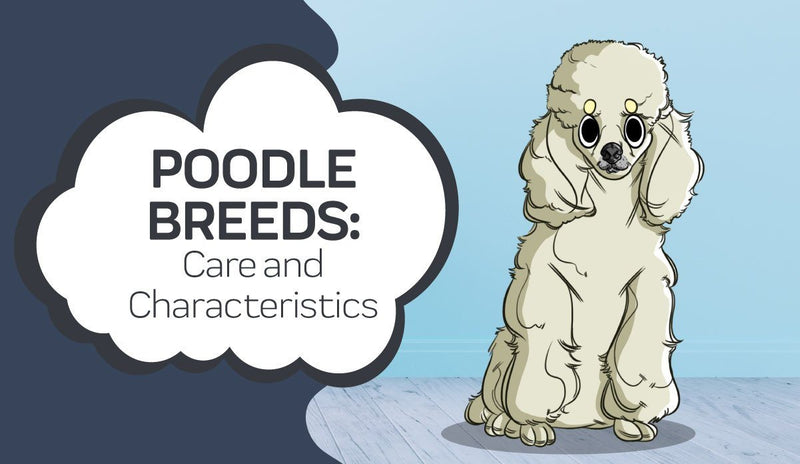
Did you know that golden doodles are not a purebred breed of dogs? While golden doodles are recognized as an individual breed, they are created by breeding golden retrievers and poodles. Golden doodles were first bred in the later part of the nineties, and ever since, they have continued to be one of the most cherished, prized, and desired dog breeds.
The very first golden doodle came to be in 1969. The golden doodle results from crossing a golden retriever with a poodle. There are five different types of poodles, including the Klein poodle, miniature poodle, standard poodle, teacup poodle, and toy poodle. Since there are five different types of poodles, there are five different variations of golden doodles that breeders can intentionally create.
From mini Goldendoodles and teacup golden doodles to the other three variations in between, golden doodles are some of the absolute cutest dogs around. Golden doodle characteristics make them one of the sweetest, softest, and most loving dog breeds you will ever encounter. Many golden doodles live to be around ten years old, with the oldest age of geriatric golden doodles being about fifteen years old.
There is not much of a difference between the average weight of male golden doodles and the average weight of female golden doodles. Golden doodles can weigh anywhere between forty-five pounds and one hundred pounds when fully grown. Male golden doodles are slightly taller than females, with a height of twenty-four to twenty-six inches tall. Female golden doodles on the other hand reach a height of around twenty-two or twenty-three inches, give or take a few centimeters.
Speaking of female golden doodles, they often give birth to litters of about five puppies at a time, but litter sizes range anywhere between three golden doodle puppies and eight puppies. As briefly mentioned, golden doodles can live up to fifteen years old. The fur of golden doodles is more of a wave than the tight curls that purebred poodles have. Golden retrievers have slick and straight fur, so the combination of golden retriever coats and the curly Q nature of poodle fur combine to create a slight wave.
Golden doodle coats come in a variety of colors, including but not limited to…
- Black
- Cream
- Deep brown
- Grey
- Golden brown
- Off-white
- Reddish-brown
When Golden Retrievers and Poodles Come Together
Golden doodles came about after other dogs were being bred with poodles, and breeders started seeing what would result from a mix of golden retrievers and poodles. In fact, golden doodles are not the only dog breed that is part poodle, part another dog breed.
Other examples of dogs with the poodle lineage in their DNA include...
- Bassetoodles
- Bernedoodles
- Bossipoos
- Boxerdoodles
- Cavapoos
- Chipoos
- Cockapoos
- Doxiepoos
- Eskipoos
- Jackapoos
- Labradoodles
- Lhasapoos
- Maltipoos
- Peekapoos
- Pomapoos
- Poochons
- Schnoodles
- Shihpoos
- Yorkipoos
Golden doodles were originally designed with the goal of producing hypoallergenic puppies so that people who are allergic to dog fur could still enjoy all the fun that comes with owning a dog. But the hypoallergenic aspect goes further than simply creating a dog that people with allergies are able to house and care for. If that were the only reason behind the breeding of golden doodles, then it would not set golden doodles apart from other dogs that are part poodle, part another breed. Poodles contribute hypoallergenic fur to the equation, but golden retrievers are very commonly adopted into programs that teach dogs how to become service pups.
Since golden retrievers are excellent service dogs, the thought behind a combination of poodles and golden retrievers is that there would then be a service animal available and accessible to people who are in need of canine service assistance but have an allergy to dog fur. The most common circumstance where golden doodles are recruited as service dogs is when someone is visually impaired, if not completely blind, and allergic to most animal fur. The hypoallergenic aspect of golden doodles is a very appreciated bonus of a golden doodle as a service pup.
Definition of Temperament and Personality for Golden Doodles

Though goldendoodle temperament is relatively identical from one goldendoodle to another, goldendoodle personality varies on an individual level. Goldendoodles temperament is described as being very apt at making friends, engaging in human interaction, and greeting fellow dog friends. While the temperament of a golden doodle is very interaction-oriented, the personality of an individual golden doodle might make the golden doodle less likely to approach strangers and more likely to restrict its friendliness to people and other dogs that the golden doodle already knows.
Temperaments and personalities influence one another, but goldendoodles temperament sets the stage for goldendoodles personality. We touched on the fact that golden doodles are very smart. But let us emphasize the intellect that golden doodles carry. They are fast learners, and eager to learn, at that. Golden doodles can be the life of the party if their personalities allow for it, but other factors like socialization during their puppy years and their past experiences in social settings will determine whether or not a golden doodle's temperament shines through in their personality. Tying into their wisdom and wit, golden doodles are curious creatures as well. They will sniff every corner of a room, explore every rock you come across on morning walks, and try to take in as many details of their environments as they possibly can.
An incredibly interesting yet often overlooked fact about golden doodles is that their personalities are harder to predict than purebred dogs. This is a result of being the offspring of two different dog breeds. Breeders cannot control the personalities or temperaments of golden doodles, and as a result, a litter of golden doodle puppies might have a variety of temperaments and personalities going on in the mix.
Some puppies might have temperaments that are more aligned with the temperament of a poodle, whereas others might be more in sync with the temperament of a golden retriever. Similarly, golden doodle puppies can have a perfectly split temperament between poodles and golden retrievers. There is more variety and less certainty when it comes to puppies born from a combination of two different breeds.
How to Train a Golden Doodle Puppy: Is Training Easy?
The high intellect levels of golden doodles make them very easy to train. The golden doodle dog breed is actually so compliant and friendly that golden doodles are often suggested as the perfect dog for anyone who has yet to own a dog of their own before. If you are a calm person and you are looking for a pet that will match your temperament, then golden doodles are the puppies for you.
They love to make their owners smile, laugh, and just happy in general, so you'll find that there is not a lot of nagging or bribing necessary in order to properly and successfully train a golden doodle. As with nearly every dog breed, golden doodles respond best to training that incorporates positive reinforcements. Golden doodles will learn best if they know when their behavior is aligned with your expectations, and showing love to your golden doodle through tummy rubs, head scratches, and treats as an award for great behavior is key.
Common Health Problems that Golden Doodles Have
Golden doodles, like many dogs, face a lot of health problems as a result of their genetic makeup, predispositions, and temperaments. While personalities do not play as much of a role in common health-related issues for golden doodles as temperaments do, their personality might shine through if and when problems arise.
If you are the proud and lucky owner of a golden doodle, a few health issues your pup might face over the years include...
- Bloating problems
- Gastric dilatation-volvulus
- Ear infections
- Elbow dysplasia
- Epilepsy and seizures
- Hip dysplasia
- Hypothyroidism
- Patellar luxation
- Separation anxiety
- Torsion
- Von Willebrand’s disease
Bloating Problems, Torsion, and Gastric Dilatation-Volvulus
Gastric dilatation-volvulus is a health issue that concerns the stomach. If you take a look at a photograph of a golden doodle, you will likely notice that their chests take up a majority of their front torso. Dogs with this body structure are most likely to experience gastric dilatation-volvulus at some point in their lives because a long torso is a contributing factor to what happens in cases of gastric dilatation-volvulus.
This health problem is denoted by an excess amount of gas that enters the stomach, becomes trapped within the organ, and then causes the stomach to twist around itself. This results in an inability for golden doodles to properly release air as it normally would, usually by way of flatulence, burps, or the most undesirable experience of vomit. The inability to get rid of the air in your dog's stomach causes your dog a great deal of discomfort, and the twisting of your pup's stomach is accompanied by improper blood flow in situations of gastric dilatation-volvulus as well.
Once blood pressure levels plummet, it is not long until a golden doodle will faint as a result of the symptoms of gastric dilatation-volvulus. This bloating problem arises most often when dogs eat their food too fast and don't fully chew the pieces before swallowing. Keeping an eye on your golden doodle puppy during and after feeding time is the best way to prevent bloating, torsion, and gastric dilatation-volvulus altogether.
Epilepsy and Seizure Disorders
Looking at golden retrievers and poodles separately, these dog breeds both have a higher risk of the onset of epilepsy at some point in the dogs' lives. So, as you can imagine, breeding two types of dogs that both already have a heightened risk for epilepsy means that golden doodles are very prone to developing epilepsy during their lifetimes, if epilepsy is not present from birth. Epilepsy is not necessarily a fatal illness, nor should the possibility of epilepsy fully deter you from adopting a golden doodle. If you or your dog's vet detect the presence of epilepsy symptoms, steps can be taken to treat the symptoms as well as prevent seizures entirely in most cases.
Separation Anxiety in Golden Doodles
Separation anxiety is not uncommon for golden doodles. It is a response that most golden doodles have when they are left alone for even the most brief of moments. Golden doodles absolutely love humans, especially the ones who love them, care for them, and spend the most time with them. Since they as such people-oriented dogs, golden doodles do not bode well with alone time. Golden doodles definitely thrive in circumstances where their owners are with them for the majority of the time, and this is absolutely something that needs to be taken into consideration before you adopt a golden doodle.
If you are often away for business or traveling on leisurely trips many days out of the year, then we advise that you not invest time, energy, love, and care into a golden doodle. Unless you are able to bring your golden doodle along with you on your vacations, then a golden doodle might not suit your situations very well. In theory, you could hire a pet sitter to care for your canine companion while you are away, but golden doodles really need the emotional connection and physical closeness with their own, more so than most dog breeds.
Thankfully, separation anxiety is not the end-all, be-all of your golden doodle’s sanity, comfort, and overall happiness. Aside from separation anxiety, other types of anxiety can arise in the disposition of your golden doodle over the years. If you are realizing that your golden doodle is having a lot of anxious symptoms, your best bet is to do your research on cannabidiol for dogs with anxiety. If you are unfamiliar with CBD and the plethora of health-related benefits that cannabidiol can offer your golden doodle, let us give you a brief overview of what CBD is and how it reduces anxiety symptoms in the temperaments of golden doodles.
CBD for Golden Doodles: What is Cannabidiol?
Cannabidiol is one of many phytocannabinoids found in the cannabis plant. There is a lot of confusion surrounding CBD to this day because the fact that it is associated with cannabis tends to send people into a defensive mindset. Many people are hesitant to look further into CBD and the countless number of benefits it provides to golden doodles solely because there is an assumption that CBD is weed.
The thing about CBD is that it can certainly be derived from marijuana plants, but it is in no way, shape, or form an ingredient that causes the same effects that weed inflicts. Although plenty of people are fond of cannabis for recreational purposes, dogs should never be exposed to what the general public thinks of as weed.
But if weed is toxic and anything but good for golden doodles, why would we suggest that you look into cannabidiol for your pets? Well, the reason for this is that cannabidiol is not psychotropic, making it completely safe and incredibly beneficial to the overall health of your pup. When you think about marijuana, you most likely immediately think about it as a natural drug that gets people high. You are not wrong, per se, but it is not cannabis itself that induces a mental and bodily high.
Rather, a cannabinoid by the anagram of THC, or tetrahydrocannabinol, is responsible for the perceptual and physical changes that weed brings about. CBD, or cannabidiol, is like THC in that it is also a cannabinoid found in the cannabis plant, but it does not contain any psychoactive properties. CBD brings about serenity, calmness, relief, and elation without any of the perception alterations or physical lightness that accompanies THC.
Where to Buy CBD for Golden Doodles with Anxiety
If you are in the market for the best cannabidiol oil that is specifically designed for dogs, then Innovet welcomes you to explore our diverse inventory of CBD products for golden doodles! CBD works wonders for pets that are experiencing a bit of anxiety here and there, as well as for dogs that have a chronic case of separation anxiety, or any other type of anxiety disorder, for that matter.
CBD oil tends to bode well with a variety of dogs, but there are certainly instances in which a golden doodle might not be the biggest fan of oil on their fur. For this reason, we also offer cannabidiol capsules that your golden doodle can swallow, doggy treats for your pup to snack on, and chewy pieces of CBD-infused dog food that will reduce the anxiety levels of your canine companion. There is a cannabidiol balm for canines, too! With so many different options of CBD for your golden doodle, follow your heart when it comes to deciding which form your dog will love the most.
No matter how you administer CBD to your golden doodle, we know for a fact that your precious pup will be better off with cannabidiol in its system. You’ll never have to worry about the possibility of your dog ingesting THC because our CBD for dogs is always in compliance with the rules surrounding the contents of CBD. We have trusted individuals to check our products before they are packaged, listed, and distributed to our customers in order to ensure that we are offering nothing but the best CBD for your golden doodles! If you have any questions, definitely feel free to reach out to the team at Innovet! We are looking forward to serving you and helping your dog feel less stressed with CBD oil for golden doodles.
Sources:
Expression of Behavioural Traits in Goldendoodles and Labradoodles
12 Facts About the Goldendoodle
The Goldendoodle
Goldendoodle Temperament
Goldendoodle
Approved by:
Dr. Sara Ochoa
Doctor of Veterinary Medicine, St. Georges University

Thanks for stopping by!
P.S. We Love You!
Sincerely,
The Innovet Team
Please do not ask for emergency or specific medical questions about your pets in the comments. Innovet Pet Products is unable to provide you with specific medical advice or counseling. A detailed physical exam, patient history, and an established veterinarian are required to provide specific medical advice. If you are worried that your pet requires emergency attention or if you have specific medical questions related to your pet’s current or chronic health conditions, please contact or visit your local/preferred veterinarian, an animal-specific poison control hotline, or your local emergency veterinary care center.
Please share your experiences and stories, your opinions and feedback about this blog, or what you've learned that you'd like to share with others.

















